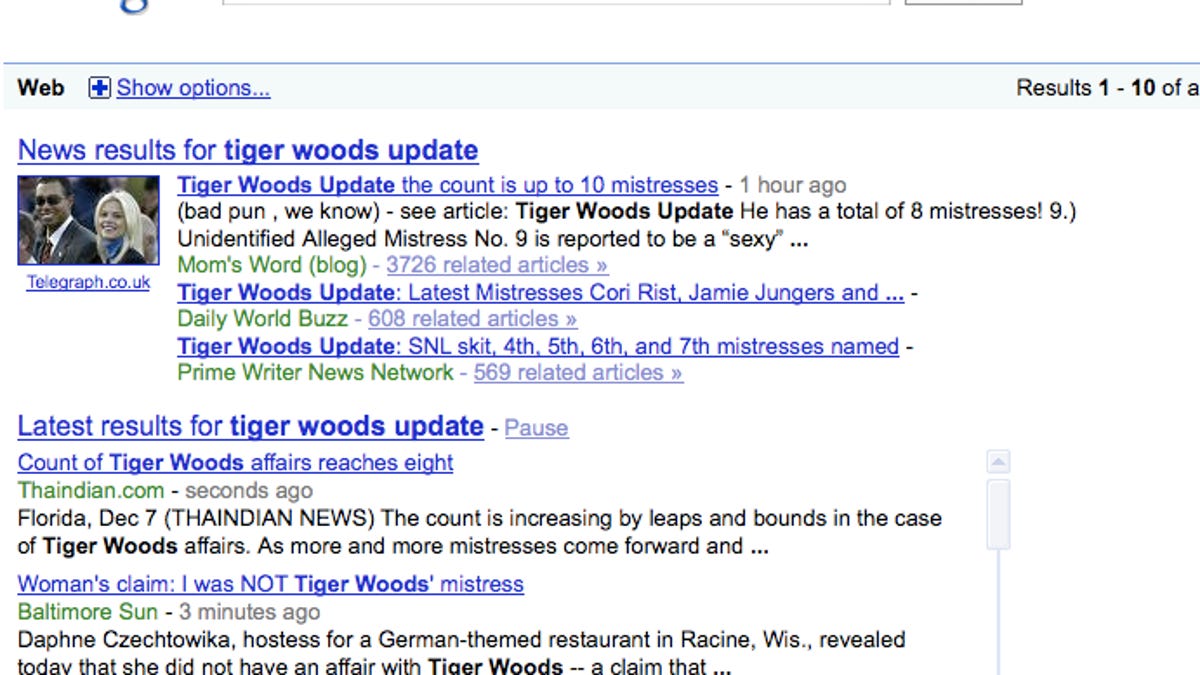Google launches real-time search
A new section of Google's search results page will be dedicated to so-called "real time" searches with automatically refreshed updates from sources like Twitter.

Google announced Monday the fruits of its earlier deal with Twitter, showing off how it has decided to present real-time Internet content within search results.
Amit Singhal, Google fellow, introduced the real-time section during an event at the Computer History Museum in Mountain View, Calif. "We are here today to announce Google real-time search," Singhal said, calling it "Google relevance technology meets the real-time Web."
Twitter search will show the latest matches for a particular search term, but Google wants to do more than sort results by time. "Relevance is the foundation of this product," Singhal said. "It's relevance, relevance, relevance."
Google will build a section called "latest results" into the regular Google search results page that automatically refreshes Internet content from sources like Twitter. Singhal showed off how a search for "Obama" would bring up tweets, Web pages, and other Internet content related to the president as it was generated. At the Web 2.0 conference in October, Google struck a deal with Twitter to get access to the service's "firehose" of tweets.
Updated 11:13 a.m. PST: Google plans to roll this out over the next several days, and not all users may see the new section immediately, Singhal said. The company also announced partnerships with social-networking companies Facebook and MySpace to display updates from those services.
Updated 11:22 a.m. PST: Real-time search at Google involves more than just social-networking and microblogging services. While Google will get information pushed to it through deals with those companies, it also has improved its crawlers to index and display virtually any Web page as it is generated. Facebook updates posted to public Facebook pages will be indexed, while any MySpace update designated as public will appear in search results.
Updated 11:30 a.m. PST: Google also demonstrated a Google Labs project called "Google Goggles," which allows a smartphone user to take a picture of a given object and send it to Google in hopes of finding out more information about that object. Up until the real-time announcement, mobile search was ruling the day, as Google's Vic Gundotra demonstrated Google Goggles, a new Android application that can show locations of interest surrounding a GPS position, and the ability for Japanese speakers to now use Google's voice search features.
Updated 12:42 p.m. PST: Marissa Mayer, Google's vice president of search and user experience, said real-time search took Google somewhat by surprise. "I wish we'd had the foresight to see this," she said.
Indeed, many people position Twitter, not Google, as central to the process of finding out what's going on right now.
There's a challenging balance between assessing what's new about a subject and what's correct, though, but Google believes the real-time search results will actually lead people to the truth faster, Singhal said. How do you assess the latest rumor when it can take time for the truth to emerge?
"Right now a straightforward answer is we emphasize quality and relevance. That often brings the truth out," Singhal said.
And when Google is deciding whether to include your own online musing, you're not just as good as your latest tweet. Just as it uses PageRank and other mechanisms to establish authority of a Web page for search, Google will apply its own measurements to those whose updates appear in real-time results.
Retweets and the number of followers a person has factor into Google's assessment of quality, he said.
Updated 2:02 p.m. PST: The real-time search features is computationally difficult, and Google had to develop more than a dozen technologies to get it working, Singhal said. Not only must it constantly monitor innumerable accounts for the latest updates, it must assess their quality and their relevance to particular queries.
Those who don't yet see the service can get to a version of it using the Google Trends site, which just emerged from beta testing. The "hot topics" area that shows items of high search interest at the moment, and clicking on one of the results shows search results with the scrolling real-time feed of information.
It's all part of getting people what they want, whether they know they want it or not. Mayer shared an example of a person buying a baby stroller.
"If you bought a product, you'd feel really foolish not knowing there was a recall," Mayer said.
And that challenge these days increasingly is a real-time phenomenon.
"In the early days of Google, we used to crawl (the Web for) information every month, then put up new index," a process called the Google dance, Singhal said. "A month was not fast enough. Then we were crawling the Web every few days, then every day, then every few hours. Now we can crawl every few minutes."
"In today's world that's not fast enough," Singhal said. "In this information environment, seconds matter."

